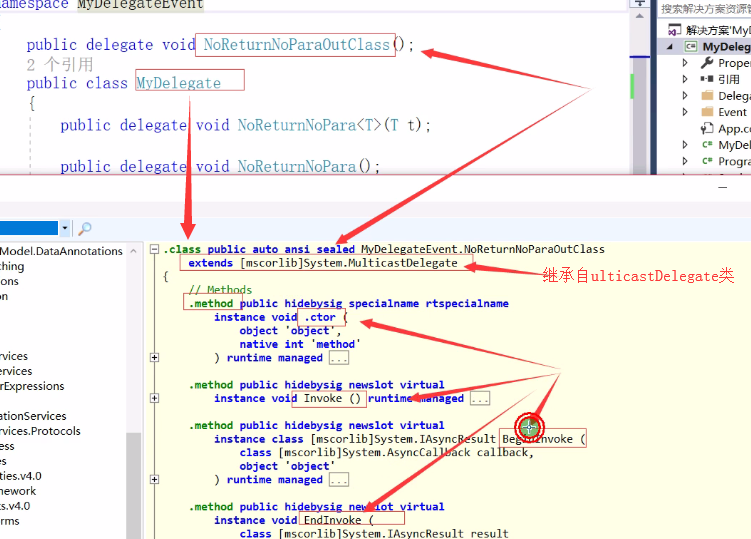一、什么是委托
委托:委托其本质实际上是一个类(一个密封的类中类) 继承自System.MulticastDelegate类,类中包含了那些Invoke,BeginInvoke,EndInvoke等方法,IL反编译查看其本质如下如

委托的声明 其语法上就是一个去掉Delegate关键字后没有方法体的方法。委托专门为方法服务的把方法作为参数可传递, 方法和委托相互协调合作。
二、委托的用处和作用
1. 委托的声明以及实例化
委托可以将方法当作方法的参数传递(委托的实例化和类的实例化类似委托其本质就是类) ,委托的参数和返回类型,都要和具体的委托方法的一致(专门为方法服务),
语法:访问修饰符 delegate 返回值类型 委托名称(参数1, 参数1, 参数n…);
如 public delegate bool thanDelegate(Student student);//委托的声明 返回类型为bool 参数为Student类
如下示例 展示了委托的声明,委托实例化及调用

1 public delegate void NoReturnNoPara();//委托的声明 2 public delegate void NoReturnWithPara(int x, int y); 3 public delegate int WithReturnNoPara(); 4 public void show() 5 { 6 Console.WriteLine("测试委托"); 7 Student student = new Student() 8 { 9 Name = "张三", 10 Mobile = "13282825652", 11 Password = "123", 12 Account = "123" 13 }; 14 //把方法包装成变量,Invoke的时候自动执行方法 15 NoReturnNoPara method = new NoReturnNoPara(this.Dothing);//委托的实例化(类似类的实例化) 把Dothing方法变量化 16 method.Invoke();//委托的调用(执行刚刚赋值该变量的方法) 17 Dothing(); 18 } 19 public void Dothing() 20 { 21 Console.WriteLine("this is Dothing"); 22 } 23 }
2.把方法当作方法的参数去传递(方法参数化委托)
委托解耦,减少重复代码,实现代码共用

1 public void ShowStudents() 2 {GetSutdent(students, 1); 3 GetSutdent(students, SelectStudent);//把方法当作参数参数传递 4 GetSutdent(students, SelectStudentAgeName);//把方法当作参数参数传递 5 6 } 7 public delegate bool thanDelegate(Student student);//委托的声明 8 /// <summary> 9 /// type:不同值 不同判断 传一个值 执行对应的行为逻辑 10 /// 传递方法(把行为逻辑当参数传递) 11 /// </summary> 12 /// <param name="source"></param> 13 /// <param name="type"></param> 14 /// <returns></returns> 15 public List<Student> GetSutdent(List<Student> source, thanDelegate than)// 传递委托 把方法传进去 16 { 17 List<Student> result = new List<Student>(); 18 foreach (Student student in source) 19 { 20 if (than.Invoke(student))//2委托的调用 21 { 22 result.Add(student); 23 } 24 } 25 return result; 26 } 27 public bool SelectStudent(Student student) 28 { 29 return student.Age > 28; 30 } 31 public bool SelectStudentName(Student student) 32 { 33 return student.Name.Length > 2; 34 } 35 public bool SelectStudentAgeName(Student student) 36 { 37 return student.Age > 25 && student.Password.Length > 3; 38 } 39 /// <summary> 40 /// type:不同值 不同判断 传一个值 执行对应的行为逻辑 41 /// </summary> 42 /// <param name="source"></param> 43 /// <param name="type"></param> 44 /// <returns></returns> 45 public List<Student> GetSutdent(List<Student> source, int type) 46 { 47 List<Student> result = new List<Student>(); 48 foreach (Student student in source) 49 { 50 if (type == 1) 51 { 52 if (student.Age > 28) 53 { 54 result.Add(student); 55 } 56 } 57 else if (type == 1) 58 { 59 if (student.Name.Length > 2) 60 { 61 result.Add(student); 62 } 63 } 64 else if (student.Age > 25 && student.Password.Length > 3) 65 { 66 result.Add(student); 67 } 68 } 69 return result; 70 }
3.委托的 异步多线程
异步 委托,所有的异步多线程都是建立在异步委托之上的,离开了异步委托是无法产生异步多线程。

public delegate int WithReturnNoPara();//返回值为int类型的委托 public void show() { //委托 beginInvoke,endInvoke { WithReturnNoPara withReturnNoPara = new WithReturnNoPara(GetInt); withReturnNoPara.Invoke(); IAsyncResult result= withReturnNoPara.BeginInvoke(null, null);//委托异步调用 withReturnNoPara.EndInvoke(result); } } public int GetInt() { return 8; }
4.多播委托
